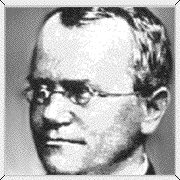 Gregor
Johann Mendel , an Austrian monk, is remembered for
his work in genetic theory. Mendel was born on July 22, 1822 in
Heinzendorf, Austria (currently part of the Czech Republic). Mendel
entered the monastery at Bruno to begin his academic career.
Gregor
Johann Mendel , an Austrian monk, is remembered for
his work in genetic theory. Mendel was born on July 22, 1822 in
Heinzendorf, Austria (currently part of the Czech Republic). Mendel
entered the monastery at Bruno to begin his academic career.
At Bruno, Mendel began his studies with pea plants. During a seven year period between 1856 and 1863 he conducted experiments on 28, 000 pea plants. From his research he developed the terminology for modern day genetics, including dominant and recessive traits.
He published his work on heredity in 1866. His work was largely ignored by the scientific community for the next three decades. In 1900 a Dutch botanist Hugo DeVries recognized the significance of Mendel's work.
Later in his career, Mendel investigated hawkweed. He ceased his experiments in 1870, fourteen years before his death. Gregor Mendel died in Brunn on January 6, 1884. His work was not recognized until after his death.
References
Daintith, J. Mitchell, S., Tootill, E. (1981). A Biographical Encyclopedia of Scientists. New York: Facts on File.
Debus, A.G. (1968). World Who's Who in Science: A Biographical Dictionary of Notable Scientists from Antiquity to the Present. Chicago: Marquis.
Howard, A.V. (1951). Chamber's Dictionary of Scientists. London: Chambers.
McGraw-Hill (1966). McGraw-Hill Modern Men of Science. New York: McGraw Hill.
Taton, R. (Ed.) (1963). History of Science: Ancient and Medieval Science from the Beginnings to 1450. New York: Basic Books.